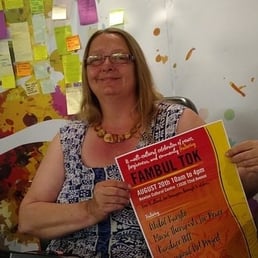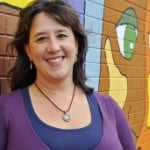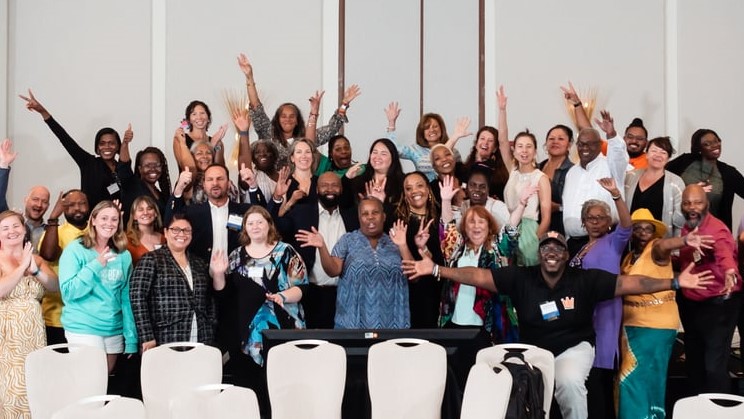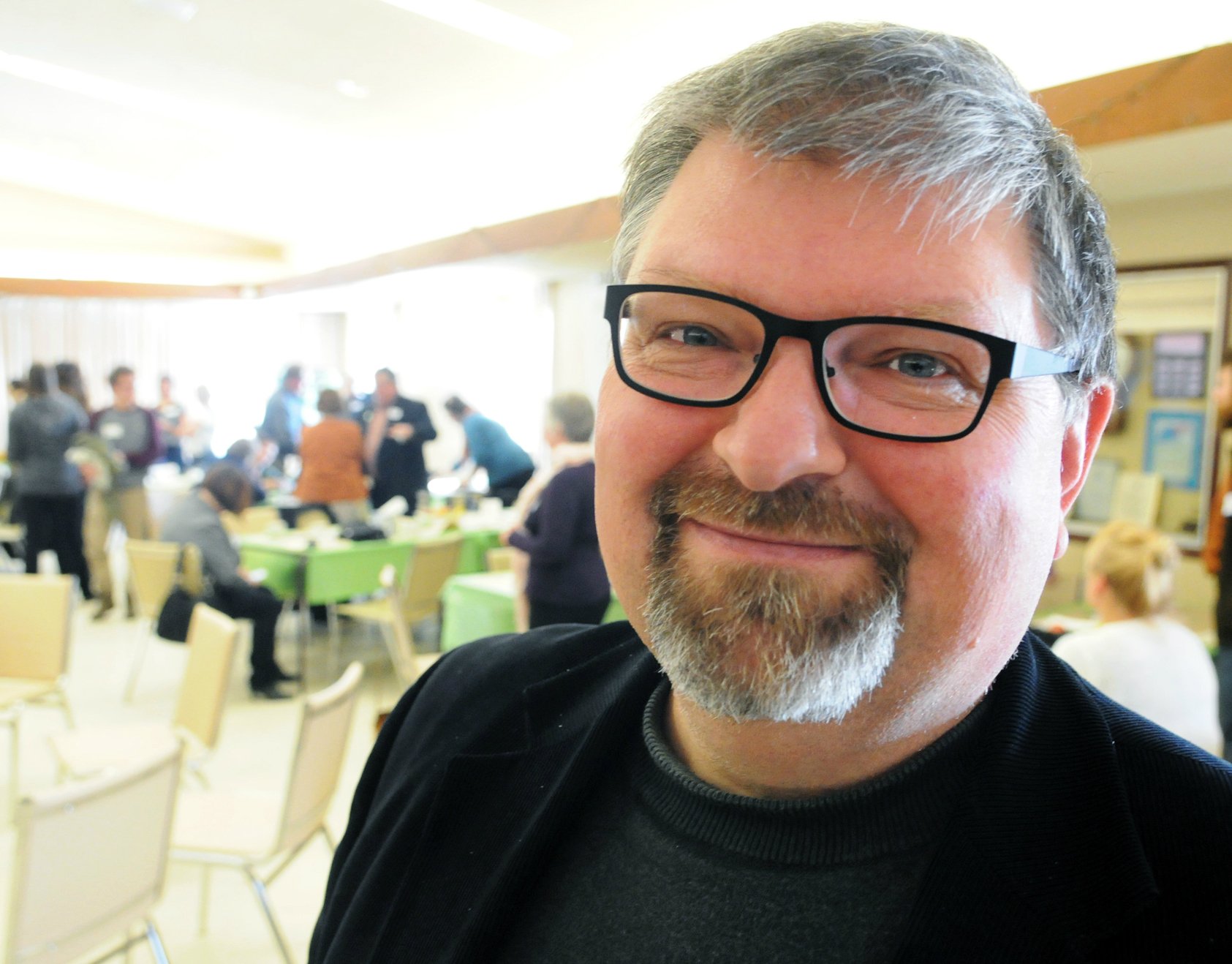
“People become the stories they hear and the stories they tell.”
- Elie Wiesel
Over the past several weeks I have had the opportunity to learn, and be inspired by, examples that illustrate how powerful the simple act of engaging in heart-felt conversation and listening can be when it is is rooted in compassion and curiosity.
At our recent Neighbourhoods ♥ the Heart of Community | Les Quartiers ♥ Le Cœur de la Communauté Learning Event in Montréal, I had the pleasure of meeting Katheren Szabo, a 55-year-old local community organizer from Surrey B.C. Katheren, who is physically disabled and lives on a fixed income, has been described as “the heart of Newton” and recognized as a driving force behind a renaissance that is now unfolding in the poor and challenged neighbourhood where she lives. Her achievements include: being a founder of Friends of the Grove – a vibrant community collective that uses music, art and playfulness to bring peace and harmony to Newton; helping to form the Cedar Bark Poets, a group of local residents that publishes a monthly anthology of poems; and, supporting the establishment of a free food garden known as The Plot.
Many of the ideas that Katheren has for community action come from what she learns while holding a 60-day vigil each year where she sits for two hours a day in a local park and just listen to residents. These vigils have confirmed that there is a great deal of loneliness and despair in Katheren’s neighbourhood. As she listens, Katheren draws from her own life experiences to offer her neighbours acknowledgement and compassion: something that many have never experienced before. Reflecting on her experience as “the community listener”, Katheren shared that, “Over the years that I have held my community vigil, people have shared stories with me of how they have been hurt by others, or wish for forgiveness for the pain that they know they have caused to others.” In response, Katheren’s latest dream is to host a ‘Fambul Toks’ peace and reconciliation process for Newton residents on August 20th, 2017.
Fambul Tok, or Family talk in Krio (An English-based slang from Sierra Leone), is a ceremony where victims and perpetuators of Sierra Leone’s 11-year civil war come together face-to-face to discuss what has happened, to heal as a collective and most importantly, to forgive. Katheren explains, “After learning about Sierra Leone’s Fambul Tok process, I got the idea to hold a modified Fambul Tok for my community to offer my wounded neighbours an opportunity to release the pain they have been internalizing and receive the forgiveness they crave. I envision Newton’s Fambul Tok event as creating a Healing Circle where one person stands and says: “I’ve have done something in my past that I was never able to say sorry for.” Then another neighbor who has been previously harmed could stand and say “I have been hurt by someone who never apologized. Thank You. I Forgive You.”
***********************
Libby and Len Traubman recently shared highlights from their “50-year adventure together” with the graduating class of Notre Dame de Namur University in California. Their work has included starting and co-sponsoring dozens of initiatives to create respectful communication between groups experiencing intense conflict. It all began more than two decades ago, in their own home, with a series of Jewish-Palestinian Living Room Dialogues that continues today. They have worked internationally to foster similar exchanges, including reconciliations between Muslims and Christians in West Africa, and also hosted inter-racial dialogues in several California cities.
In 1984, in the midst of the “Cold War” between the Soviet Union and America, the Traubmans spent three weeks in Russia listening to the life stories of people there. As Len notes, “We experienced their equal humanity, and realized forever that “an enemy is one whose story we have not heard.” We returned home inspired and alive — not kidnapped, poisoned, or imprisoned as our parents feared. This experience also taught the Traubmans the power of sharing our stories with one another because conflict resolution begins with first knowing the other human being. “Who are you? Tell me your story.”
The Traubmans have produced six films to document the role of dialogue and listening in conflict resolution. Their documentary Dialogue in Nigeria is still used today by African facilitators who use the film’s practices to resolve tribal wars and, to know and de-stigmatize people with disabilities, and include them fully in community life. More recently, following the 2017 post-elections in San Mateo County, the Traubmans hosted CROSSING LINES IN SAN MATEO: Sharing Stories, Creating Community an event which features 115 diverse men and women, ages 18 to 85, experiencing “what many never do in a whole lifetime — being given voices and ears, being heard and hearing, with a new quality of listening-to-learn, listening to everyone.”
In reflecting on their work, the Traubmans offered this inspiration to the graduates,
“This next epoch of your adult life means less dependency and more initiating; taking less and more giving. But giving what? We’ve illustrated what you already know — what strengthens families and ends war — everyone has a story that needs, even cries, to be listened to. Unheard and disregarded, very good, loving women, men, and youth can become hopeless, desperate, violent, even terrorists. This is preventable and curable — by you — if today you can choose to become a great listener. As the first one in the room to listen, you have the power to change the relationship.”
Learn More:
- Read Katheren Szabo’s Blog about hosting the first-ever Fambul-Tok Celebration in Surrey BC
- Download STORIES OF CHANGE: Creating a Culture of Connection in The Citizens’ Century Libby and Len Traubman’s 2017 commencement address at Notre Dame de Namur University
- Listen to CROSSING LINES IN SAN MATEO which shares the stories of 115 diverse residents
- Watch a trailer for Dialogue in Nigeria, a documentary by Libby and Len Traubman
- Learn more about Local Deepening Community Initiatives – A Partnership with Tamarack to host community conversations that strengthen neighbourhoods and reweave their social fabric





